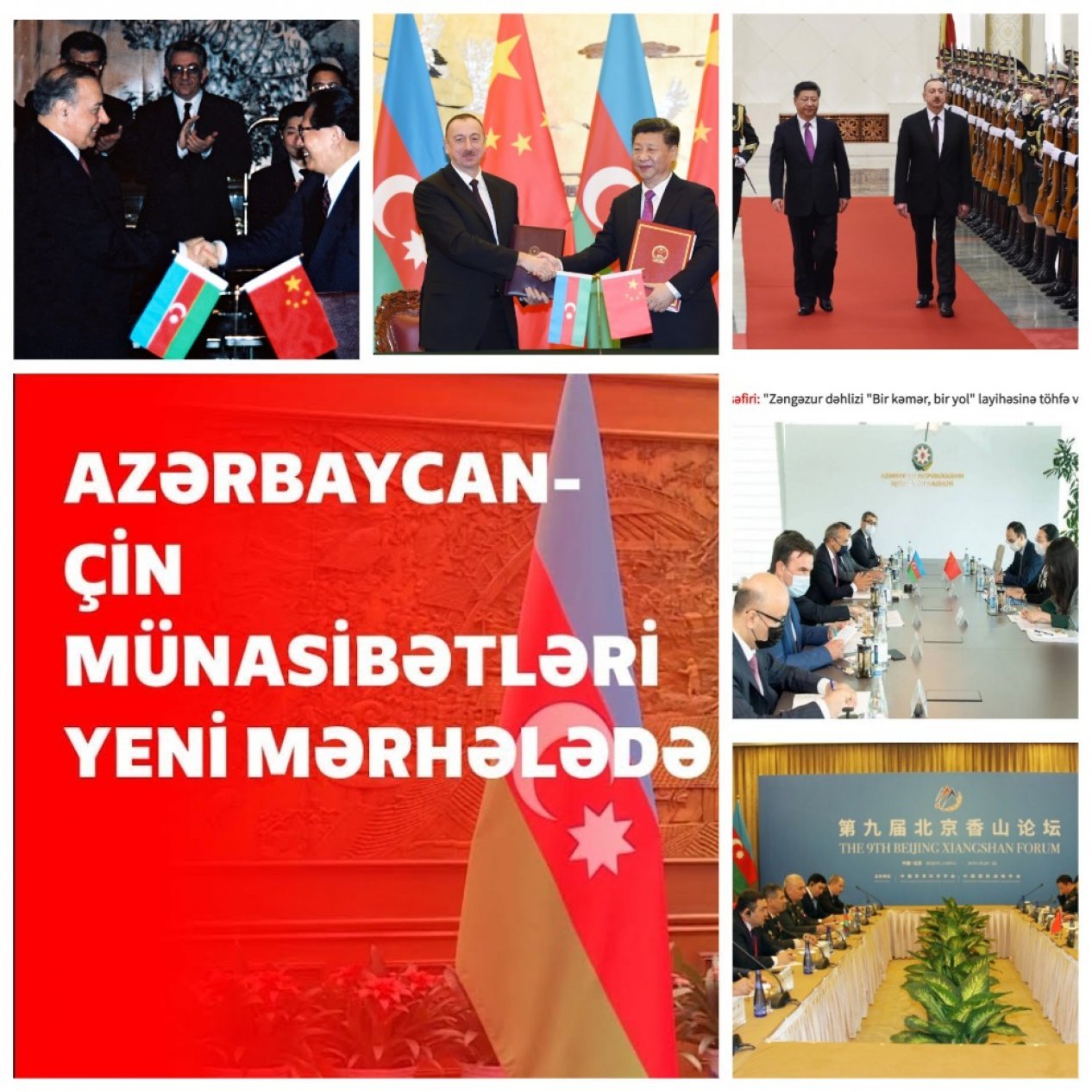
Further development of close multifaceted relations with the People's Republic of China, which is the dominant power center of the Asia-Pacific region and the second strongest economy in the world, takes the main place in the multilateral and balanced foreign policy of the modern Republic of Azerbaijan. Azerbaijan, distinguished by its geographical and geo-economic position and rich natural resources, has always been at the forefront of the geostrategic interests of superpowers, including China, and these interests are growing even more in the current conditions.
Azerbaijan is a leading state that has a say in the South Caucasus region and actively conducts an independent policy that meets national interests in complex geopolitical and geoeconomic conditions, and participates in ensuring the world's energy security. China, as one of the economic powerhouses of Asia and the world, is distinguished by its special weight and role in world politics and economy, and its ability to influence important global processes. From this point of view, Azerbaijan, the leading country of the South Caucasus, and China, one of the world's economic poles, share a number of geopolitical-economic common visions and strategic interests.
Although the foundation of bilateral relations was laid in 1992, direct political contacts between Beijing and Baku began to develop after the official visit of Azerbaijan’s National Leader Heydar Aliyev to the People's Republic of China on March 7-10, 1994. During the visit, 8 agreements were signed between the two states, which became a solid pillar for the dynamics of future multilateral relations.
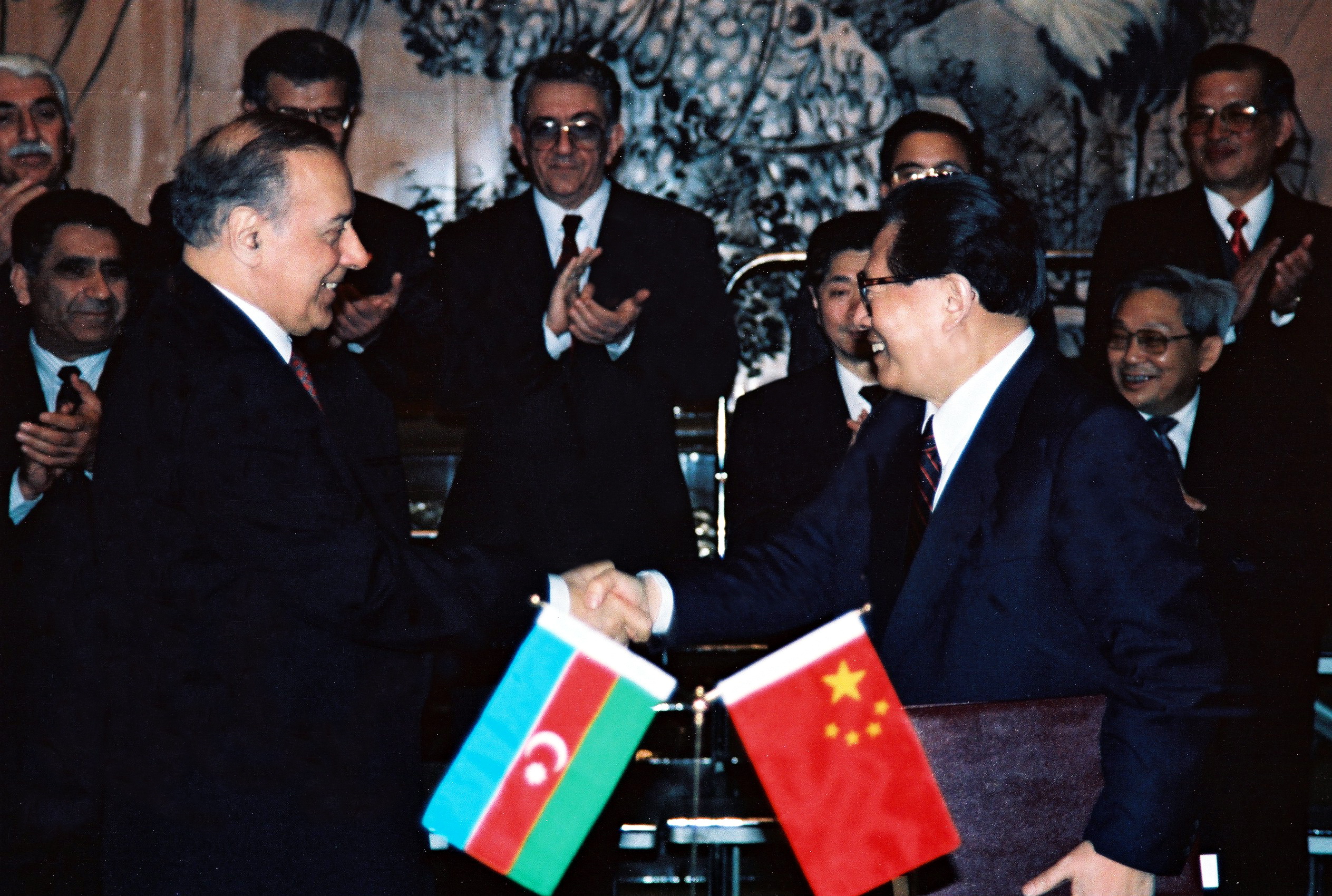
The Chinese government has shown clear political will and declared that it recognizes Azerbaijan's state sovereignty and the inviolability of its borders and that they stand by Baku in the Azerbaijan-Armenia conflict. In the following years, the visits of the Chinese government delegation to Azerbaijan led to the strengthening of the political dialogue between the parties, the consolidation of economic cooperation, as well as the further development of relations between the two countries’ parliaments. source
On September 7-8, 1998, the Summit meeting of European and Asian heads of state in Baku with the participation of representatives of 32 countries and 13 international organizations within the framework of the TRACECA program on the restoration of the historic Silk Road created a solid foundation for the close participation of Azerbaijan and China in international transport transits.
In June 2000, the Chairman of the Standing Committee of the People's Assembly of China, Li Peng, visited Azerbaijan and held the groundbreaking ceremony of the new building of the Embassy of the People's Republic of China in Baku, opening a new page in the multifaceted relations. reference
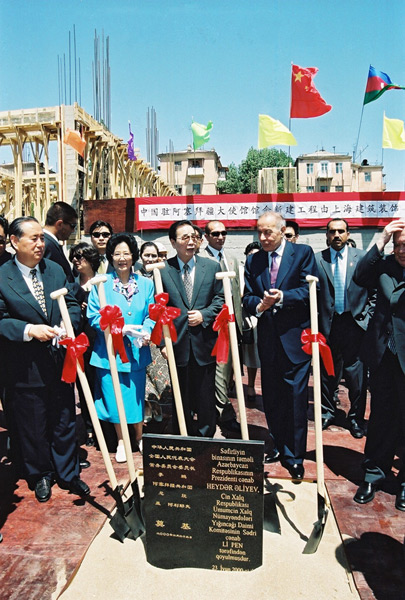
President Ilham Aliyev's official visits and fruitful meetings with the heads of state and the government of China have ensured that Azerbaijan-China relations have reached the highest level in recent years, developing on the principles of close friendship and mutual respect. On March 17-19, 2005, President Ilham Aliyev's official visit to the People's Republic of China and his meeting with the President of the People's Republic of China Xu Szintao were remembered as very important events in the history of the two countries’ relations. Mr. Xu Szintao highly appreciated the position of Azerbaijan as a leading country in the South Caucasus. reference
The visit of the President of Azerbaijan to China in 2008 was significant in the modern development of mutual relations. During the visit of the head of state to China in December 2015, the "Joint Declaration on further development and deepening of friendly and cooperative relations" was signed between the two states. Also, the signing of the "Memorandum of Understanding between the Government of the Republic of Azerbaijan and the Government of the People's Republic of China on the joint promotion of the establishment of the Silk Road Economic Belt" confirmed the clear intention and purpose of Azerbaijan in the "One Belt, One Road" initiative. reference
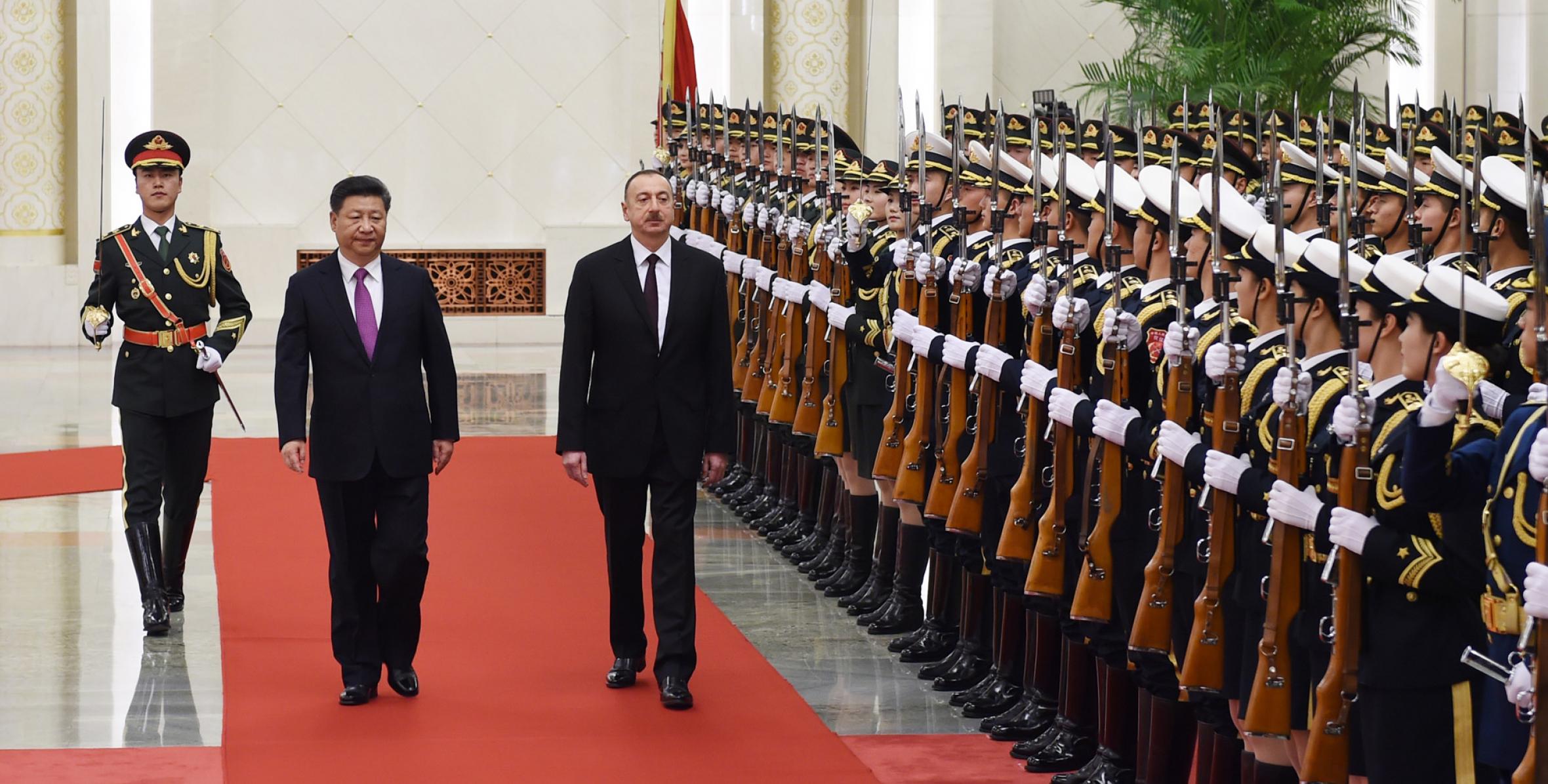
The visit of the President of Azerbaijan to China on April 24, 2019, and his participation in the 2nd "One Belt, One Road" International Cooperation Forum in Beijing defined new directions of cooperation. Meetings with Chinese businessmen within the framework of the visit were of great importance in the transition of economic relations to a new stage. source
The People's Republic of China, one of the five permanent members of the UN Security Council, has always supported Azerbaijan's territorial integrity and its borders’ inviolability, and has repeatedly declared that Karabakh is Azerbaijan's territory. In turn, Azerbaijan supports China's "One China" position. This position was confirmed during the visits in 1996, 2005 and 2015. In the 2015 Interstate Joint Statement, the parties did not participate in any alliance or bloc aimed at opposing the sovereignty, security, and territorial integrity of each other, did not allow the creation of organizations and groups in their territories that would harm the state sovereignty, security, and territorial integrity of the other party. source
The Azerbaijan-China cooperation can also be assessed successful in the military field. In December 2009, an agreement was signed "On the provision of free military assistance by China to Azerbaijan". The three-item document reflects China's gratuitous military aid of 3 million yuan to Azerbaijan. reference
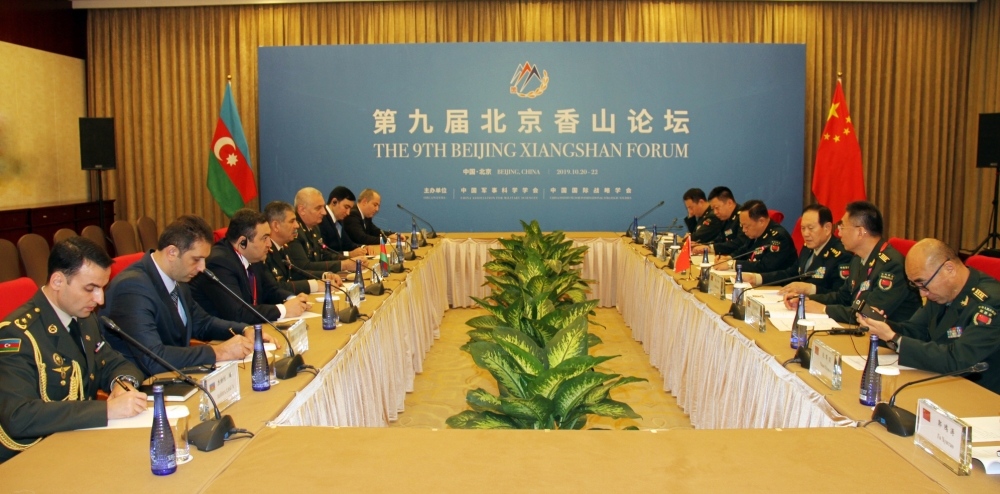
Another such agreement was signed in Beijing in January 2013, and China provided free military aid of 3 million yuan to Azerbaijan. source
The last agreement with the same content was signed in April 2018 in Beijing. In January 2019, the delegation led by the Minister of Defense of Azerbaijan, Colonel-General Zakir Hasanov, and the Minister of National Defense of the People's Republic of China, Colonel-General Wei Fenghe, signed other documents on cooperation in the military field in Beijing. With this, a new stage in Azerbaijan-China relations in the military field has begun.
The agenda of economic relations between the two countries are extremely rich. After the establishment of the Azerbaijan-China Intergovernmental Economic Commission in 2009, there was a real turn in the dynamics of economic relations, and the volume of both trade turnover and mutual investments increased sharply. source
The joint actions of the Government Commission and the increase in mutual economic agreements have led to a continuous increase in the volume of goods and investment turnover, and economic relations have reached the highest level since 2010. In 2015, the volume of mutual goods turnover exceeded $500 million. Thus, the trade turnover in 2015 was $561 million, in 2016 it was $975 million, in 2017 it was $1.3 billion, in 2018 it was $1.31 billion, in 2019 and 2020 it was $2.1 billion. In 2022, the trade turnover between the two countries reached $ 2.2 billion. In previous years, Azerbaijan’s main trade partner was China, that is, it had a special share in product exports to Azerbaijan, but in recent years, Azerbaijan's exports to China have started to increase in mutual trade. (reference) For comparison, let's note that in 1992, the trade turnover between the two countries was only $1.5 million, which means that the volume of trade turnover has grown 1500 times. Azerbaijan accounts for 47-48% of China's trade portfolio with South Caucasus.
Currently, China is one of the 5 largest trade partners of Azerbaijan, and ranks 4th among them. It ranks 3rd in imports. China is also considered one of the potential investors in Azerbaijan. So far, up to $1 billion have been invested in Azerbaijan. In turn, Azerbaijan has a special share in large-scale investments in this country of the Asia-Pacific region; the volume of investments exceeds $1.7 billion.
Chinese companies are represented in various fields - oil, industry, energy, finance, banking, communication, ICT, agriculture and non-oil sectors - of the Azerbaijani economy, and currently, their number is about 120. At present, there is a trade representative in the Embassy of Azerbaijan in China, as well as trade and wine houses of Azerbaijan have opened in the Chinese cities of Urumqi, Shanghai and Lucou. Thanks to these activities, political contacts between the two countries are further strengthened, and the geography and structure of economic cooperation are expanding.
Azerbaijan became a member of the Asian Infrastructure Investment Bank in 2016, and the Bank has invested in numerous economic projects in Azerbaijan. The largest investment loan of the Bank was the allocation of $600 million to the TANAP project. In total, the Asian Development Bank has allocated $4 billion in loans to Azerbaijan. reference
Azerbaijan applies a simplified visa procedure for Chinese citizens. The visa can be obtained at the international airports of Azerbaijan. There are regular direct flights between Azerbaijan and China.
The humanitarian branch of Sino-Azerbaijani relations is also broad. During the COVID-19 pandemic, both countries showed strong will, showed solidarity in the fight against this global scourge, and supported each other, China was one of the first countries to give the vaccine to Azerbaijan.
There is a close and beneficial cooperation between the two countries in the field of transport and logistics. Azerbaijan is located between East and West, on the route of the traditional Silk Road, and this strategic position creates many opportunities for Azerbaijan. Azerbaijan was one of the first countries to support the "One Belt, One Road" initiative, which was authored by China, and during the visit of President Ilham Aliyev to China in 2015, a Memorandum of Understanding was signed between Azerbaijan and China on the implementation of the "Silk Road Economic Belt".
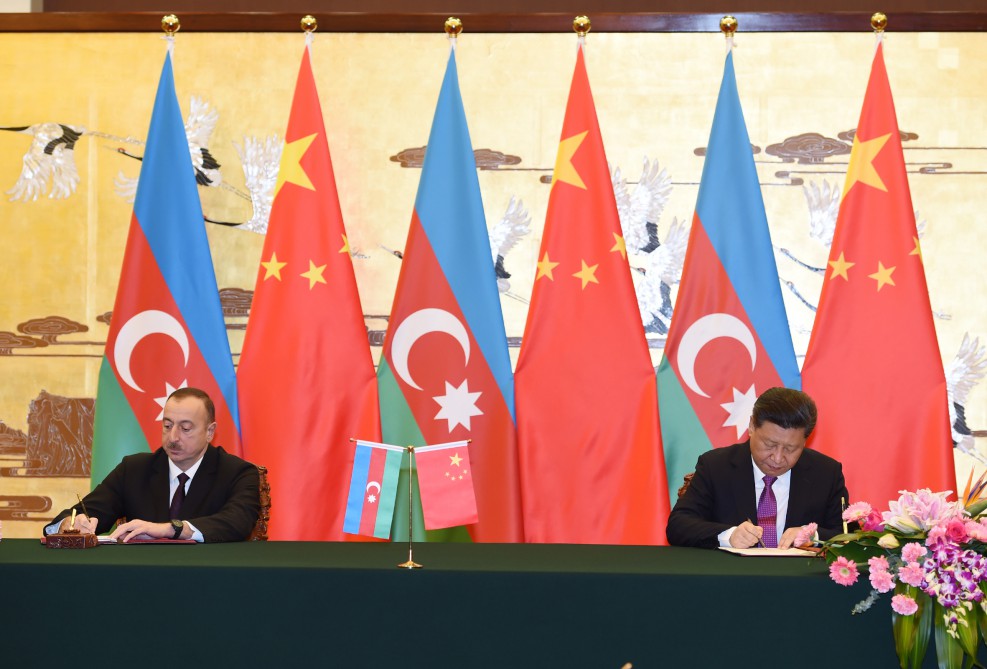
Being an active member of the East-West, North-South, North-West and Trans-Caspian international transport corridors, Azerbaijan has completely renewed its transport infrastructure after joining the "One Belt, One Road" project. The construction of Baku International Sea Port, the largest commercial hub on the Caspian Sea, commissioning of Baku-Tbilisi-Kars, creation of the Alat Free Economic Zone, diversification and modernization of railway infrastructures, creation of new projects such as highways, airports are also part of "One Belt, One Road" and serve the initiative.
Thus, Azerbaijan, which plays a very important role in the construction of the Middle Corridor, has managed to realize all the goals of the "Silk Road Economic Belt" concept by preparing Baku-Tbilisi-Kars and other huge transport-logistics junctions for use.
According to estimates, after the "One Belt, One Road" project is fully operational, the capacity of the Baku International Sea Trade Port, which currently has the capacity to handle 15 million tons through the Caspian Sea, will be increased to 25-30 million tons. As a result, Azerbaijan will receive large foreign exchange earnings from transit transportation. source
Also, Baku-Tbilisi-Kars, another huge railway route of the region, is becoming one of the most convenient and profitable junctions for transportation in the "One Belt, One Road" project. In 2015, the first container train from China arrived in Azerbaijan via the Caspian Sea, and the implementation of cargo transportation through the Baku-Tbilisi-Kars railway in 2018 confirms that this corridor has begun to operate.
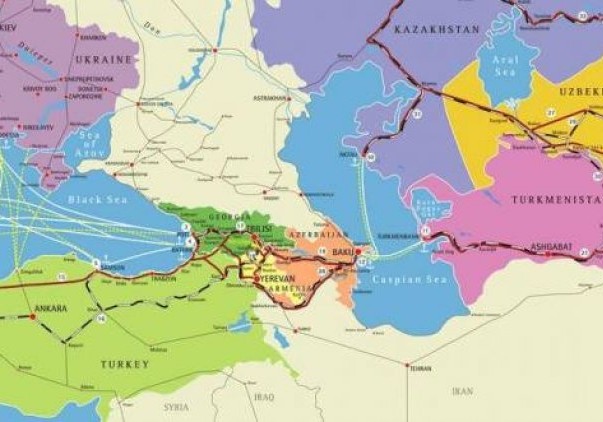
The possibilities are greater, there is a map of Zangazur ahead, and the logistics map of this region is also changing against the background of the new realities created by Azerbaijan. Zangazur Corridor is the shortest corridor that will ensure the diversification of transport connections between China, Central Asian countries and European countries. The commissioning of this corridor can allow the transportation of approximately 35 million tons of cargo through Azerbaijan annually. This means a trans-logistics capacity greater than that of the Baku International Sea Trade Port.
The reintegration of the Zangazur Corridor into the "One Belt, One Road" project is already on the table, and official Beijing also considers this route one of the main links of the new Silk Road.
One of the most strategic purposes of this corridor is the restoration of land connections with Nakhchivan and Azerbaijan proper and the transformation of Nakhchivan into a bridge connecting the Caspian-Mediterranean Sea. Establishing a communication system with Nakhchivan is especially important for the Silk Road in terms of distance and speed of cargo delivery. The Nakhchivan road is 1.7 times or 343 kilometers shorter than the Baku-Tbilisi-Kars railway line, and will reduce the cost and duration of transportation and can serve as the most profitable bridge between Central Asia and Europe. Thus, joining the Zangazur corridor to the "One Belt, One Road" project serves the interests of more than 30 countries. The reality of connecting the Zangazur corridor with "One Belt, One Road" was discussed with the Chinese Ambassador to Azerbaijan at the level of state officials in Baku, and the goal is to ensure the versatility of this huge transport artery. reference
A few months ago, Prime Minister of Azerbaijan Ali Asadov discussed opportunities for cooperation within the framework of the "East-West", "Middle Corridor", "One Belt, One Road" projects in a meeting with Wu Hongbo, the special representative of the Chinese government on European affairs, who visited Baku. reference
President Ilham Aliyev urged the countries of the region to join the 77th session of the UN Economic and Social Commission for Asia and the Pacific, informing them about the economic opportunities of this corridor. Quote:
"Currently, we are working on the Zangazur transport corridor, which will be a part of the East-West corridor connecting Asia and Europe from the territory of Azerbaijan. This corridor will allow Azerbaijan to strengthen its position as a transport and logistics hub of Eurasia. I invite partner countries from Asia and the Pacific to consider the potential of this regional project."
Also, at the 38th General Assembly of the Automobile Manufacturers' Association held in Istanbul, Azerbaijan offered the Black Sea Economic Cooperation (BSEC) member countries to use the opportunities of the Zangazur corridor. The effectiveness of this corridor in terms of stimulation of international cargo transportation opportunities and economic profitability of the member countries of the CSTO was brought to the attention.
Most countries of the Caspian and Eurasian region already agree that the Zangazur corridor is indeed the easiest, safest, most profitable, and cheapest option in terms of transportation. At the XV Summit of the Economic Cooperation Organization held in Ashgabat on November 28, 2021, the President of Azerbaijan drew attention to the fact that the Zangazur corridor has become a reality and expressed his confidence that OIC member countries would use this corridor. reference
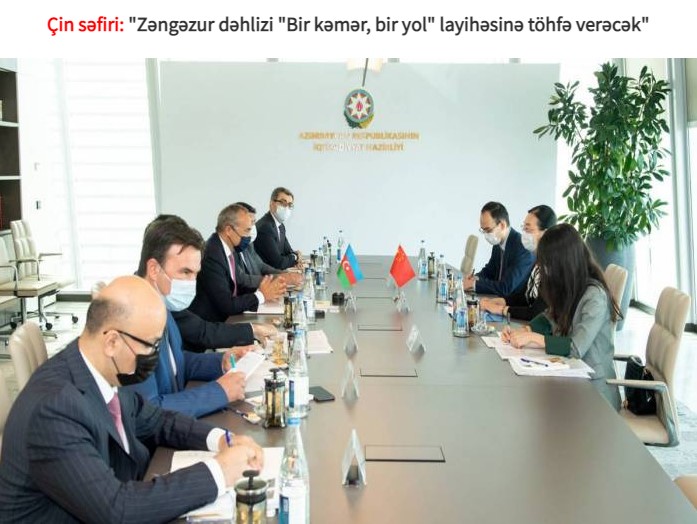
At the end of that meeting, the countries that signed the declaration expressed their agreement to coordinate joint activities on new transport corridors in the Eurasian region. This is an expression of agreement to join the Zangazur corridor, which has become the main link of the Asia-Trans-Caspian-Europe route.
It is clear that Iran is obstructing the Zangazur Corridor, Tehran is trying to deprive Armenia of historical economic opportunities as it does not want a direct land transport connection between Azerbaijan and Türkiye. This corridor will be opened sooner or later anyway. Therefore, Armenia should give up its illogical and foolish policy and voluntarily agree to the opening of this corridor as soon as possible and should think about its future security and the benefits and dividends it will gain from the economic opportunities that open up.
One of the main lines in the cooperation program of the new era is the concept of "green energy". The government of Azerbaijan prioritizes increasing the share of renewable energy sources in electricity generation to 30 percent by 2030, turning the territories freed from occupation into "green energy" zones in the energy policy of Azerbaijan. According to the decree signed by the head of state "On measures related to the creation of a "green energy" zone in the liberated territories of the Republic of Azerbaijan", it is planned to prepare a "green energy" concept and a master plan in the liberated territories.
Cooperation with China, as one of the main partner countries, is in the foreground for the implementation of the planned tech goals in this field. Currently, China is the world leader in the production of electricity from renewable sources, and according to this indicator, it is twice ahead of its closest competitor, the United States. Electricity production from renewable sources in this country has reached 1000 gigawatts, which means 43.5 percent of the total generation capacity potential. The Chinese government has set a target of 1200 gigawatts of solar and wind power by 2030. According to the calculations of world institutions, China will provide about 43 percent of the renewable energy potential of the world in the near future. reference
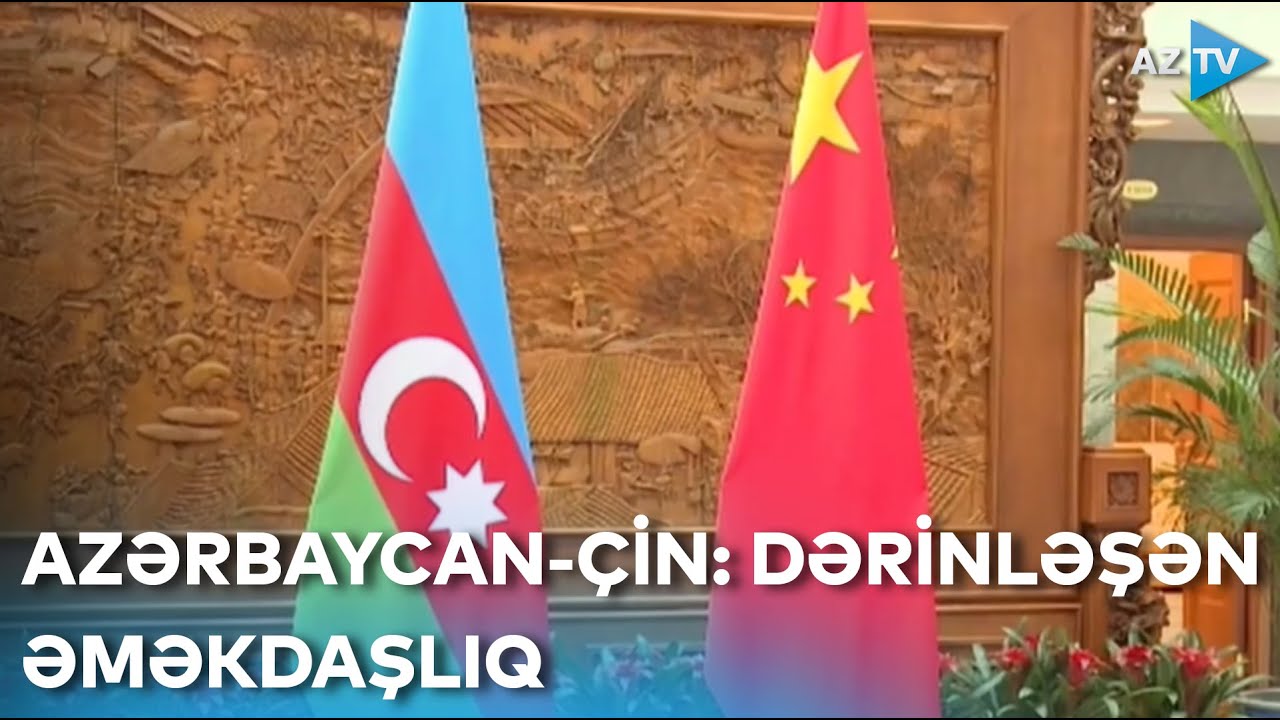
In Davos, President Ilham Aliyev once again reiterated that special importance is attached to cooperation with China in the implementation of the "Green Energy" concept: Quote: "We would like to expand our green energy collaboration with China, because there is a lot of potential in Azerbaijan. There are also big technological achievements in China. So, we need to combine these efforts. With respect to our priorities, renewable sources of energy have now become one of our main priorities. During the recent several months, we signed documents that will provide investments to create 22 gigawatts of renewable sources of energy, both onshore and offshore. And that will completely change the regional economic configuration, because we know about the green transition that is taking place in Europe. At the same time, Azerbaijan is a supplier of oil and natural gas. So, now we're planning to supply green energy, including green hydrogen, which will be produced from the offshore wind power stations. As I said, we already signed preliminary documents, and of course, agreements will be signed in the future. But this really has a very big potential, not only for our country but for the whole region. And we also need to invest in the transmission lines to be able to export because we do not need so much energy for ourselves."
One of the main pillars of the portfolio in the "green energy" techno system is the liberated areas. The region is rich in renewable energy resources, with a proven potential of around 10,000 MW combined with solar and wind power. Azerbaijan's demand for renewable energy sources is 7,900-8,000 MW, which means that the potential of the liberated areas not only meets local demand, but also allows for export. source
The interest of Chinese businessmen in the region is also not small, after Azerbaijan liberated its lands from occupation, when it presented the map of this region to the world investors, one of the first messages came from Beijing. Chinese companies also contributed to the new technologies applied in the "Smart Village" built in the Aghali village of Zangilan, along with Turkish, Italian and Israeli companies. The Chinese company "Huawei" is currently one of the main suppliers of technologies used in the creation of "Smart cities and villages" in other regions. It is not excluded that Chinese companies and techno-investors are in the foreground in the implementation of other techno-projects. source
On March 7, 2023, President Ilham Aliyev, receiving the special representative of the Chinese government for European affairs, Wu Hongbo, invited Chinese companies to work in Azerbaijan’s liberated territories, taking into account the great technological capabilities in the field of renewable energy. source

Chinese companies are also very interested in Industrial Parks, and the government of Azerbaijan has introduced tax and customs concessions for foreign investors from January 1, 2023, and given great economic incentives. These factors are the most reliable state guarantee for Chinese businessmen's close participation in innovative projects and new opportunities for investments.
Currently, maintaining the balance of interstate relations in the world, and maintaining mutual dynamics in the course of foreign policy, requires a very restrained and wise policy. The President of Azerbaijan, who implements a multi-vector and pragmatic foreign policy, is considered as the author of a very smart and flexible, at the same time visionary policy to strengthen the position of Azerbaijan in the modern international relations system and world politics, located in a complex region like the South Caucasus. In the current complex geopolitical conditions, it is extremely wise and skillful to ensure coordination on the North-South, East-West, Caucasus, Caspian-Black-Baltic Sea basins and Central Asia vectors, and at the same time protect national interests and interests on the map where regional and global processes are deeply characterized. is required. In this regard, Azerbaijan, as the most powerful actor in the South Caucasus, demonstrates its balanced political will at the intersection of the interests of the West and the East, and this political line meets the interests of China as well. By consolidating its dominant position with "soft economic power" without affecting Russia's interests in the South Caucasus, China is also filling the created political vacuum.
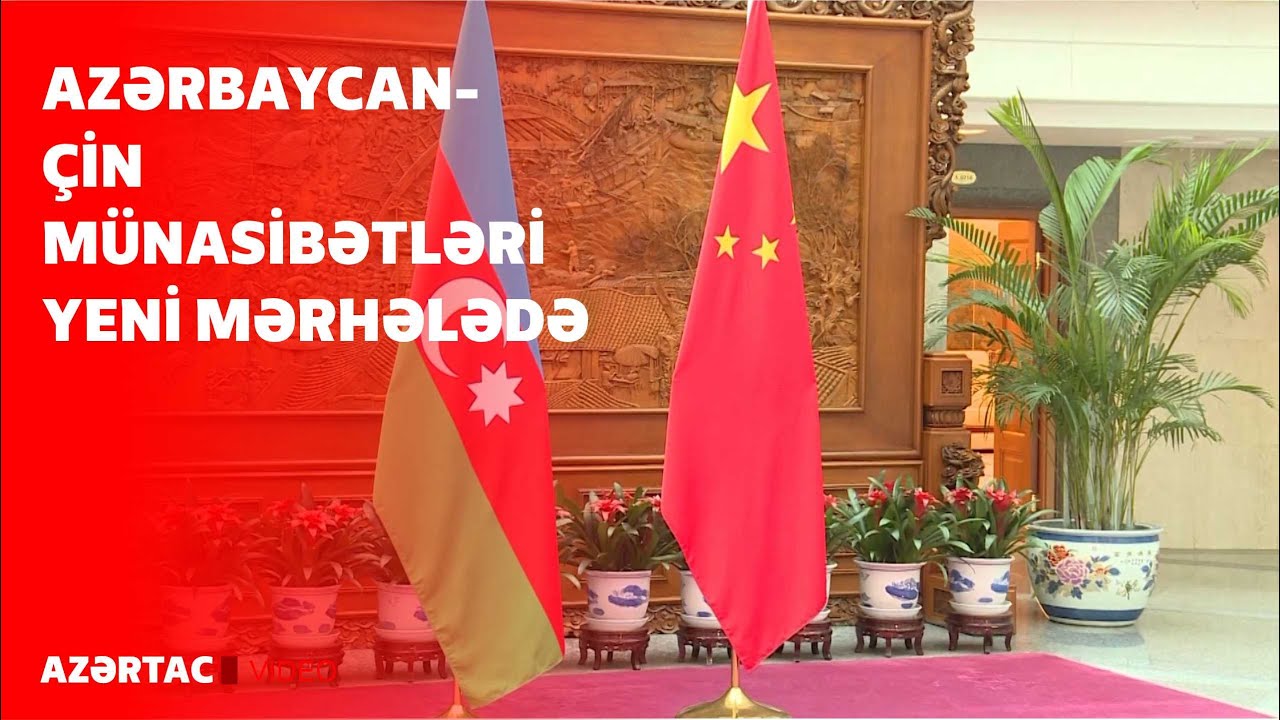
In this complex period, official Baku and Beijing are acting with equal intentions and objectives in terms of the development of mutually beneficial cooperation, regional and international security, economic development, and the expansion of cultural relations. On January 17, 2023, President Ilham Aliyev, in an interview with China's CGTN television channel in Davos, gave a message of the modern vision of Azerbaijan-China relations and future goals against the backdrop of new geopolitical realities in the world and the region, and stated that the political relations that have continued for 30 years have created reliable foundations. Quote: “We have established a very solid platform for our cooperation. We have had a political relationship for 30 years, which demonstrates that we are excellent partners and trustworthy friends. We have very good cooperation in international institutions. We always supported each other's territorial integrity and sovereignty and established a very strong political platform. So, based on that, we are now constructing a framework for our economic cooperation.”
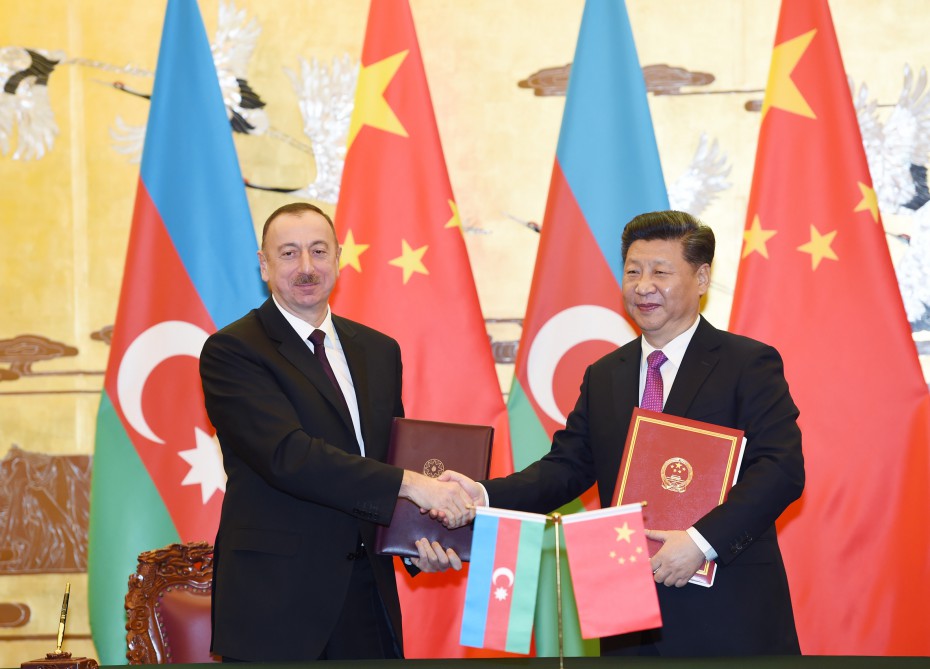
In conclusion, we can characterize the Summary of Azerbaijan-China relations as follows:
♦ Azerbaijan and China are determined to raise their successful cooperation to a new level based on mutual trust and friendship. This cooperation creates favorable conditions for political relations to reach a strategic point, with economic and commercial relations reaching the highest level thanks to the historical Silk Road between the two countries.
♦ At the level of the leaders of both countries, the direction aims to coordinate all potential opportunities of the new portfolio of cooperation, to contribute to global peace by expanding humanitarian diplomacy. The geo-economic-transit map of the last 5 years stipulates that the directions of the foreign economic policy carried out by both countries fully complement each other.
♦ Increasing new technocratic initiatives between the two countries, developing the concept of "green energy" in Azerbaijan, and prioritizing the use of the rich experience of the People's Republic of China in the application of the latest economic models and technologies in the liberated areas can play an important role in the opening of Karabakh and Eastern Zangezur to Chinese businessmen.
♦ Azerbaijan and China are determined and resolute to create a strong friendship and unity format in the region against the background of the creation of the Zangazur Corridor by closely cooperating as states interested in the formation and diversification of new transport, energy and transit routes, and the establishment of the East-West security and cooperation corridor. These initiatives, which are of strategic importance for the countries of the Eurasian region, serve to contribute to strengthening stability and security, increasing peace and progress from East to West.




















